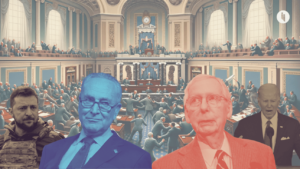Chinese authorities have launched a criminal investigation into Zhongzhi Enterprise Group, one of the country’s biggest shadow lenders, days after it told investors it was “severely insolvent”. The firm blamed “internal management [running] wild” for its problems, which is one of the rarer corporate excuses you’re ever likely to hear.
“Shadow banks” emerged in China after the global financial crisis in 2007 to satisfy the country’s ravenous appetite for credit. But they’re largely unregulated and are therefore not subject to the same risk, liquidity, and capital restrictions as traditional banks. The sector is now worth ~$2.9T.
So, what’s the problem? During the good times (aka pre-COVID), nothing. China’s shadow banking sector helped facilitate huge government investments in infrastructure that would otherwise be uneconomical.
Stay on top of your world from inside your inbox.
Subscribe for free today and receive way much more insights.
Trusted by 99,000+ subscribers
No spam. No noise. Unsubscribe any time.
But right now, China’s economic fortunes are not so good:
- Chinese debt (private + government debt) reached a dizzying 280% of GDP back in May (and the real figure is likely higher)
- Recent forecasts suggest the economy will probably meet its 5% growth target but will slow in 2024 (and the real figures are likely lower), and
- Foreign investment outflows have already exceeded $100 billion this year, which will further depress growth next year.
Slowing growth is a problem for China’s shadow banks because they hold a lot of high-risk municipal government and real estate debt. In the worst case, a rapid collapse of the shadow banking system could threaten a wider crash in China’s economy.
But that nightmare scenario remains highly unlikely. Xi Jinping has staked his legitimacy and legacy on his promise of restoring Chinese greatness. That means he’ll do everything in his considerable power to ensure that Zhongzhi’s collapse – and any others in the future – are quarantined from the rest of the economy.
INTRIGUE’S TAKE
The most important question then becomes, what can Xi Jinping do to stem the economic bleeding? In true decision-by-(standing)-committee style, he looks to be going for a little bit of everything:
- Throw caution to the wind and borrow more. Beijing decided in October to issue $100B worth of new sovereign debt bonds (a decision finance expert Michael Pettis called polluting “the last clean balance sheet left in China”).
- Direct state banks to lend more. Regulators have released several directives over the last few weeks to push banks to give more loans to private businesses to try to shore up confidence.
- Attempt to reverse the foreign investment outflow. By sucking up and playing nice with President Biden two weeks ago, Xi is hoping a tactical stabilisation in relations with the West will be enough to at least slow the capital exodus.
Make no mistake – the threat to China’s economy is real, but sooner or later, all these measures have to start working… don’t they?
Also worth noting:
- Xi Jinping is expected in Shanghai today, his first visit to the financial capital of China since 2020. (The South China Morning Post had the unverified scoop via a very rare leak of Xi’s travel diary).
- The Communist Party surprisingly failed to announce a date for a key meeting known as the ‘third plenum’ yesterday – the lack of policy clarity will fuel concerns for domestic companies as well as foreign companies working in or investing in China.









